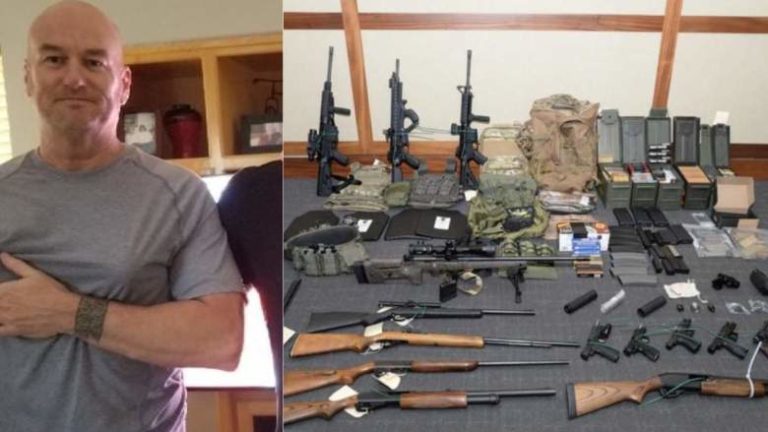A federal judge said Monday that he will decide by the end of this week whether to dismiss gun charges against a Coast Guard lieutenant accused of stockpiling combat gear and compiling a hit list of prominent Democrats and TV journalists.
Christopher Hasson, 50, is asking U.S. District Judge George Hazel in Maryland to dismiss three of the four counts in his indictment. The judge didn’t immediately rule Monday after hearing testimony from expert witnesses and arguments from attorneys.
Hasson’s lawyers argue that two of the four counts in his indictment, both charging him with unlawful possession of firearm silencers, violate his Second Amendment right to bear arms. Assistant federal public defender Cullen Macbeth said the Second Amendment protects silencers along with firearms and ammunition.
“Courts have given the word ‘arms’ an expansive interpretation,” Macbeth said.
A prosecutor, however, said other courts already have held that the Second Amendment doesn’t cover silencers.
“You can use guns just fine without silencers,” said Assistant U.S. Attorney Thomas Windom.
Hasson also is charged with possession of firearms by unlawful user or addict of a controlled substance, and illegal possession of tramadol, an opioid painkiller. Defense attorneys are asking Hazel to dismiss the other gun charge on different grounds. They haven’t sought the pretrial dismissal of the drug charge, a misdemeanor.
Prosecutors have called Hasson a domestic terrorist intent on carrying out a mass killing, but they haven’t filed any terrorism-related charges against him since his February arrest.
During a hearing earlier this year, Windom said the government had no doubt that Hasson’s arrest prevented bloodshed. Hasson is a self-described white nationalist who has espoused extremist views for years and “intends to murder innocent civilians on a scale rarely seen in this country,” Windom wrote. Hasson also drafted an email in which he said he was “dreaming of a way to kill almost every last person on earth,” Windom said.
Public defender Liz Oyer has said prosecutors haven’t filed terrorism-related charges against Hasson because they haven’t found any evidence to back up those allegations. She accused prosecutors of seeking to punish Hasson for “private thoughts” that he never shared.
Prosecutors have said Hasson created what appeared to be a computer-spreadsheet hit list that included Democratic presidential hopefuls Sens. Kirsten Gillibrand, Elizabeth Warren, Cory Booker and Kamala Harris. Also mentioned were MSNBC’s Chris Hayes and Joe Scarborough and CNN’s Chris Cuomo and Van Jones. Hasson also targeted two Supreme Court justices and two social media company executives and searched online for their home addresses in March 2018, within minutes of searching firearm sales websites, according to prosecutors.
Investigators found 15 guns, including seven rifles, and more than 1,000 rounds of ammunition at Hasson’s basement apartment in Silver Spring, Maryland. He researched how to make homemade bombs and mortars, studied sniper training and used his government computer to search for information about Nazis and Adolf Hitler, prosecutors said.
The judge didn’t hear any testimony or arguments about the government’s terrorism-related allegations during Monday’s hearing.
A defense expert said gun owners primarily want to use silencers for hearing protection and to increase the accuracy of some firearms. Macbeth, the public defender, said there is no evidence that silencers are widely used to commit violent crimes.
“Silencers are part of using weapons effectively,” Macbeth said.
Windom noted that easily acquired items, such as oil filters and flashlights, are used to make homemade silencers. The prosecutor questioned whether defense attorneys were arguing that those items also merit Second Amendment protection, but Macbeth said they weren’t.
“These are all arguments to present to Congress and not the court,” Windom said. “The court should not have to be splitting these hairs.”
Silencers are regulated by the National Firearms Act. Nearly 1.5 million silencers were registered with the Bureau of Alcohol, Tobacco, Firearms and Explosives as of February 2018, up from approximately 285,000 in 2010, according to Hasson’s lawyers.
Hasson, a former Marine, worked at Coast Guard headquarters in Washington on a program to acquire advanced new cutters for the agency. He has remained held in federal custody since his arrest.
(AP)










